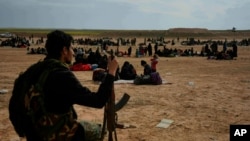The United States should continue stabilizing areas recently liberated from the Islamic State (IS) terror group in Syria and use its leverage to push for a political settlement in the war-torn country, a Syrian Kurdish official said.
Sinam Mohamad, a political representative for the U.S.-backed Syrian Democratic Forces (SDF), a Kurdish-led military alliance, said now that the U.S. has helped defeat IS militarily, its Syria policy needs to reflect the new dynamics on the ground.
The U.S. “now should focus on mitigating tensions in the region and preventing new conflicts,” Mohamad told VOA.
“Supporting the democratic project in northeastern Syria will be a turning point in the future of the country, which will help change the [Syrian] regime and establish a democratic system that is inclusive to all Syrians,” she said.
Since 2014, the U.S has led an international coalition against IS. In March, the SDF declared victory over IS in its last stronghold in eastern Syria.
The U.S. has about 2,000 troops in the country. But U.S. President Donald Trump has decided to withdraw these forces from Syria, while keeping only 400 troops.
There are “voices in the Trump administration and in the U.S. Congress that are calling against this withdrawal and warned from its consequences in enabling the Russian and Iranian influence,” Kurdish official Mohamad said.
Russia and Iran, two staunch supporters of the Syrian regime of President Bashar al-Assad, have a strong military presence in Syria since the beginning of the civil war in 2011.
US Congress letter
Last month, nearly 400 U.S. lawmakers, Republican and Democratic, sent a letter to President Trump urging him to remain engaged in the Syrian conflict.
The letter emphasized on protecting Israel’s security, putting more pressure on Russia, Iran and Iranian proxies, and preventing terrorist groups from re-emerging in ungoverned territory in Syria.
“The conflict in Syria is complicated, and the potential solutions are not perfect, but our only choice is to advance policies that can stop the growing threats to U.S. interests, Israel, and regional security and stability,” the letter said.
“This strategy requires American leadership,” it added.
The Syrian regime opposes the American involvement in Syria, calling the presences of U.S. forces in parts of the country illegal.
Some analysts like Bassam Abu Abdullah, a Damascus-based political analyst and former professor of international relations at Damascus University, charge that U.S. policy in Syria solely focuses supporting Kurdish autonomy in Syria’s northeast.
“The U.S. should look after its own interests instead of Israel’s. This can be achieved by withdrawing its troops from Syria and allowing Syrians to decide their fate for themselves through local elections,” Abu Abdullah told VOA.
He added that the battle on the ground will determine the course of the situation in Syria as Syrian regime troops are pushing to rid rebel groups from their last stronghold in Idlib province.
US engagement necessary
Some Syrian experts believe the U.S. involvement in any peace process in Syria is key to putting an end to Syria’s civil war that has been raging since 2011.
Radwan Ziadeh, a senior fellow at Arab Center in Washington, said that a clear U.S. vision in Syria is essential to guarantee effective results.
“The Trump administration has to link the end of extremist groups in Syria with a political transition without al-Assad regime in Damascus,” Ziadeh told VOA.
Since the beginning of the conflict, the U.S. has supported different peace initiatives, including multiple U.N.-sponsored, intra-Syrian talks in Geneva, that have yet to yield any significant outcomes.
Major disagreements among regional and international powers involved in the Syrian conflict have delayed the talks.
Mohammed al-Abdallah, the director of the Washington-based Syria Justice and Accountability Center, believes that the U.S. should take the lead to begin a “breakthrough in the political negotiations” in Syria.
“The U.S. needs to generate some trust and confidence in the political process that includes putting pressure to release detainees, stopping the military action in Idlib, and working toward stopping the expropriation of people’s properties so people can return to their homes,” al-Abdallah told VOA.
According to the U.N., half of Syria’s prewar population of 22 million has been displaced inside Syria and in the region.




